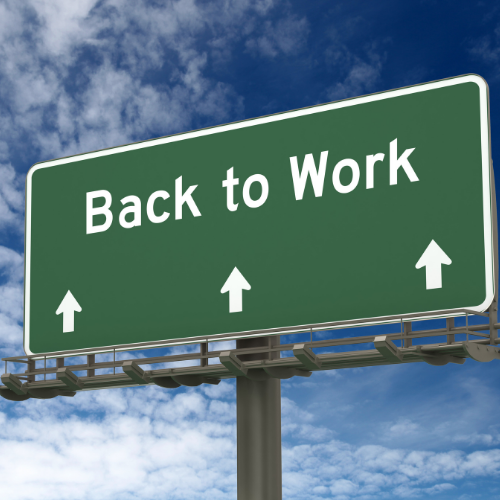#Time2Work Campaign Modules
The Time2Work resource contains three modules which are designed to support:

Module 1:
Young people with RMDs entering the workplace for the first time

Module 2:
People already in work when they develop an RMD

Module 3:
People with RMDs returning to work after rehabilitation
Each module is made up of a series of fact sheets with information and tips designed for people with RMDs working in paid employment or the voluntary sector.
The modules are designed to be flexible so you can produce the whole module, or produce the fact sheets separately, or grouped to create individualised information packs. The modules and factsheets can be printed or provided as pdfs online.
The topics in some of the fact sheets are applicable across more than one module, for example the glossary of business terms, whilst others are similar, but tailored to the audience for each of the modules, for example preparing for an interview.
The fact sheets provide general advice to help people access work and to cope with some of the challenges encountered in the workplace, such as whether to tell your employer and/or co-workers about your condition and, if so, what to tell them.
These modules were originally developed in 2010 but were reviewed and updated by a core working group comprising representatives from rheumatologty, health professionals in rheumatology (HPR) and representatives from national organisations of PARE living with an RMD, as well as by a wider review panel – see acknowledgments.
The English text is provided in a pdf format. Alternatively, the modules or individual factsheets can be adapted to reflect your national practices and translated for use by your organisation.
Contents of the modules:
Module 1 Young people entering the workplace for the first time
- Introduction
- What employers want
- Approaching potential employers – template letters / applications etc
- Preparing for an interview with a potential employer
- How your doctor and healthcare team can help
- Talking to employers, managers and co-workers
Module 2 People who are already employed when they develop a rheumatic disease
- Introduction
- To disclose or not to disclose?
- Talking to employers / managers
- Talking to co-workers
- Adapting your workplace
- How your doctor and healthcare team can help
Module 3 People re-entering the workplace after rehabilitation
- Introduction
- How your doctor and healthcare team can help
- What employers want
- Retraining and building confidence
- Preparing for an interview with a potential employer
- To disclose or not to disclose
- Adapting the workplace
Use of logos
Please do not publish any of the translated materials in your country using the EULAR logo. We suggest national organisations of PARE use their logos on the materials. The nationally adapted material should make reference to the material provided by EULAR as follows: This document is part of the EULAR Don’t Delay, connect today Time2Work campaign.
Adapting and translating the modules
Please note that some of the information in these fact sheets is based on UK definitions of disability and legislation, so you may need to adapt certain sectors to make the information relevant and factually correct in your country.
You will find highlighted areas suggesting where you might want or need to provide additional or appropriate information for your country. You may need to seek expert advice on areas such as benefits and employment law and these areas may need to be updated periodically to reflect any changes in legislation. It would also be useful to provide links to helpful websites in your local language at the end of each fact sheet so people can search for further information should they need it.
Acknowledgements
EULAR would like to thank and acknowledge the valuable support, guidance and input of the following people in reviewing and updating the factsheets in this resource:
Core Review Working Group
Prof. Tanja Stamm, Austria, representing EULAR Health Professionals in Rheumatology
Prof. Alessia Alunno, Italy, representing EMEUNET
Ms Boryana Boteva, Bulgaria, representing PARE
Mr Peter Boyd, Ireland representing Young PARE
Dr Elsa Mateus, Portugal, representing the EULAR PARE Committee
Ms Erika Mosor, Austria, representing EULAR Health Professionals in Rheumatology
Specialist Review Panel
EULAR Health Professionals in Rheumatology
Prof. Matilda Björk, Sweden
Dr Andrea Domján, Hungary
Dr Emma Dures, United Kingdom
Dr Fernando Estevez-Lopez, Netherlands
Prof. Jette Primdahl, Denmark
Dr Yeliz Prior, United Kingdom
Dr Ross Wilkie, United Kingdom